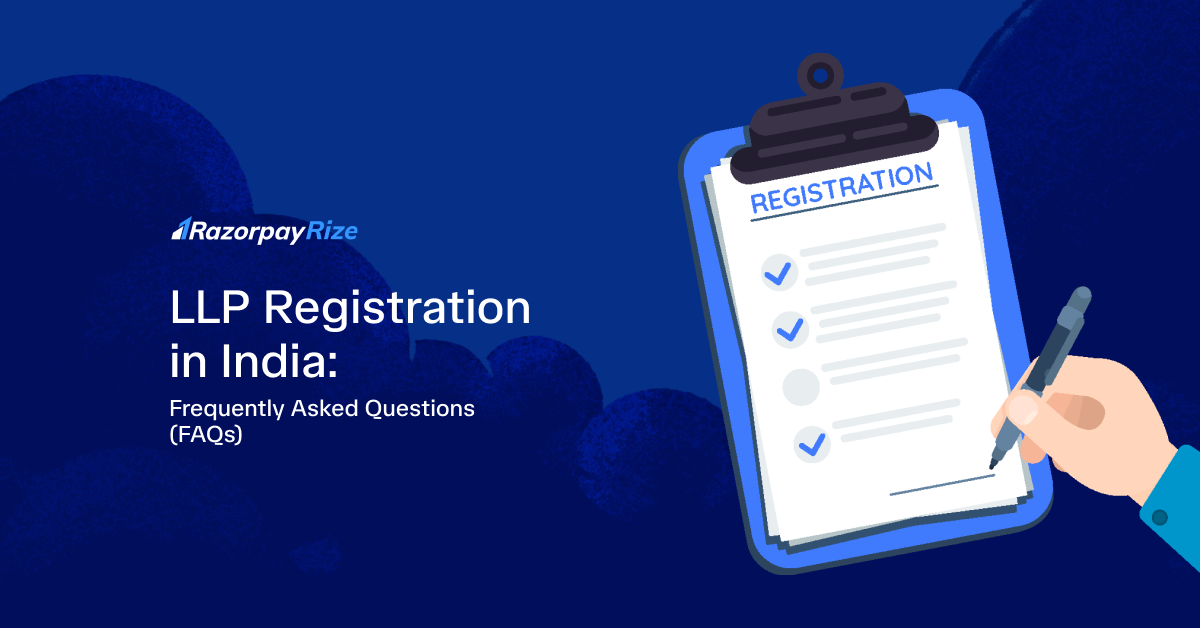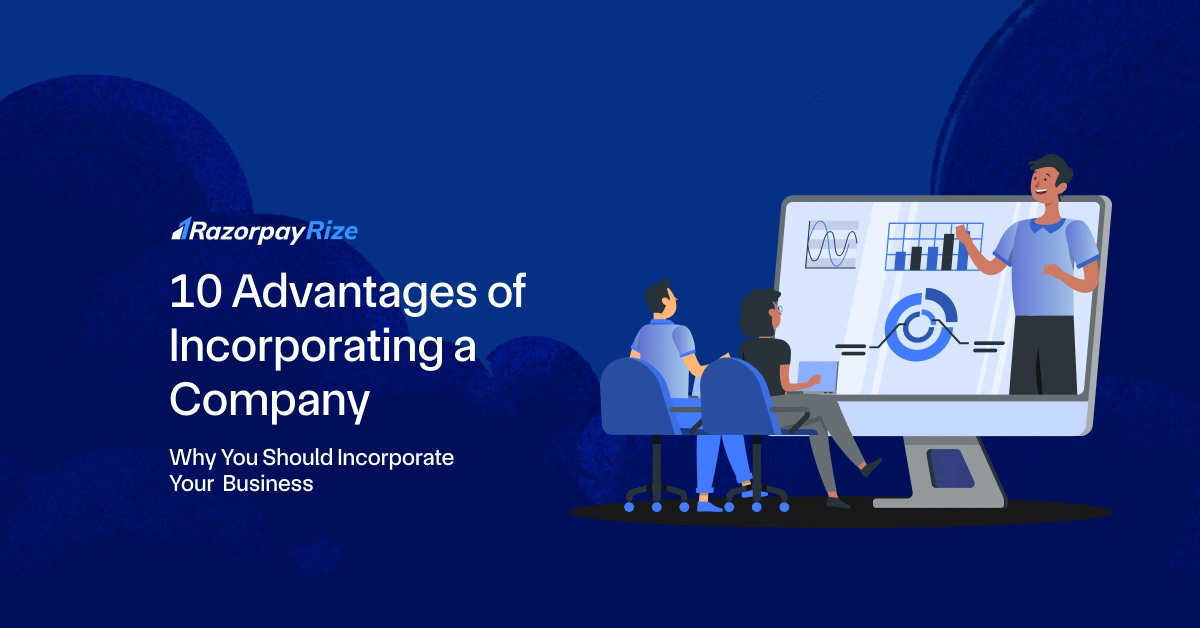Limited Liability Partnership (LLP) registration is one of the most popular business structures in India, offering the flexibility of a partnership with the limited liability benefits of a company. Entrepreneurs often have several questions about the registration process, documents, compliance, and costs involved. In this guide, we’ve compiled the most frequently asked questions about LLP registration to help you understand every step clearly.
Table of Contents
Section 1: Understanding LLP: The Basics
1. What is an LLP?
A Limited Liability Partnership (LLP) is a business structure that combines the flexibility of a partnership with the limited liability benefits of a company. Partners are not personally liable for the debts of the business, making it a preferred option for startups and small businesses.
2. What are the advantages of choosing LLP over a Private Limited Company?
- Lower compliance burden and costs
- No requirement of minimum paid-up capital
- Flexibility in internal management
- Limited liability protection for partners
3. What is the difference between an LLP and traditional partnership firm?
- LLP offers limited liability; a partnership firm does not.
- LLP is registered with MCA, while partnerships are registered under the state-level Registrar of Firms.
- LLP has separate legal identity, but a partnership does not.
4. Can an LLP own property?
Yes, an LLP is a separate legal entity and can own property, open bank accounts, and enter into contracts in its own name.
Section 2: Registration: Requirements & Process
5. Who can register an LLP in India?
Any two or more individuals (at least one must be a resident of India) can register an LLP. There is no maximum limit on the number of partners. Both individuals and corporate entities can become partners.
6. What are the minimum requirements for LLP registration?
- Minimum of 2 partners (no upper limit)
- 1 resident partner (must have stayed in India at least 182 days in the last year)
- Digital Signature Certificate (DSC) for all partners
7. What documents are required to register an LLP?
- PAN card of all partners
- Identity proof (Aadhaar, Voter ID, Passport, or Driving License)
- Address proof of partners
- Address proof of the registered office (rent agreement/ownership proof + utility bill)
- Passport-size photographs
8. Is DSC mandatory for LLP registration?
Yes, every designated partner must have a Digital Signature Certificate (DSC) for filing online forms with the MCA.
9. What is the LLP Agreement?
The LLP Agreement defines the rights, duties, and responsibilities of partners. It must be filed in Form 3 within 30 days of incorporation.
10. Is stamp duty applicable on the LLP Agreement?
Yes. Stamp duty is applicable based on the state of registration and the amount of capital contribution.
11. Is there a minimum capital requirement to start an LLP?
No, there is no minimum capital requirement. Partners can start an LLP with any amount of capital contribution.
12. Can an LLP be started at a residential address?
Yes, you can register an LLP at your residential address. You just need to provide proof of address (electricity bill/telephone bill) along with a No Objection Certificate (NOC) from the owner.
13. What is LLP Form FiLLiP?
Form FiLLiP (Form for Incorporation of Limited Liability Partnership) is the MCA e-form used for LLP registration. It covers:
- Reservation of name
- Incorporation details
- Partner details
14. How long does it take to register an LLP in India?
Generally, it takes 7–10 working days, depending on document verification and MCA processing speed.
15. What is the cost of LLP registration?
The cost varies depending on professional fees and stamp duty (which differs by state). On average, it ranges from ₹10,000 to ₹15,000.
Section 3: Partners, Capital & Funding
16. Can one person start an LLP alone?
No, LLPs require a minimum of two partners. If one partner leaves, the LLP must admit a new partner within six months.
17. Can an LLP change partners after registration?
Yes. Partners can be added, removed, or changed anytime by filing Form 4 with MCA.
18. Can foreign nationals or NRIs become partners in an LLP?
Yes, foreign nationals and NRIs can become partners in an LLP, provided there is at least one resident Indian partner.
19. Can an LLP raise funds from investors?
Yes, LLPs can raise funds, but not by issuing shares like a private limited company. Instead, they can raise capital through partner contributions, loans, or convertible instruments.
20. Can an LLP issue shares to raise capital?
No. LLPs cannot issue shares. Capital can only be raised by partner contributions or external borrowings.
21. Can an LLP be listed on a stock exchange?
No. LLPs cannot be listed. Only public companies can list their shares on stock exchanges.
22. Is FDI (Foreign Direct Investment) allowed in LLPs?
Yes, FDI is permitted in LLPs under the automatic route in sectors where 100% FDI is allowed, subject to FEMA regulations.
23. How is profit shared in an LLP?
Profits are shared among partners as per the LLP Agreement. If no agreement exists, they are shared equally.
Section 4: Post-Registration: Compliance & Taxation
24. What are the compliance requirements after registering an LLP?
- Filing of Form 11 (Annual Return) by 30th May every year
- Filing of Form 8 (Statement of Account & Solvency) by 30th October every year
- Maintenance of proper books of accounts
- Filing of Income Tax Return annually
25. Do LLPs need to be audited?
LLPs are only required to get their accounts audited if:
- Annual turnover exceeds ₹40 lakhs, or
- Capital contribution exceeds ₹25 lakhs.
26. How is an LLP taxed in India?
LLPs are taxed at flat 30% income tax on profits excluding applicable surcharge and cess. Partners are not taxed separately on profit share (as it is exempt in their hands).
27. Is GST registration mandatory for an LLP?
GST registration is mandatory only if:
- Annual turnover exceeds ₹40 lakhs (₹20 lakhs for service providers in some states), or
- The LLP engages in inter-state supply of goods/services.
28. What happens if an LLP doesn’t file annual returns?
Non-compliance attracts heavy penalties. The fine is ₹100 per day of delay, with no maximum limit, until the return is filed.
29. What is the penalty for not maintaining an LLP agreement?
If an LLP does not execute and file an LLP Agreement within 30 days of incorporation, it attracts a fine of ₹100 per day of delay, with no cap.
Section 5: LLP Operations & Management
30. Can an LLP change its name after registration?
Yes, an LLP can change its name by filing Form 5 with the MCA and getting approval from the Registrar.
31. Can LLPs carry out any business activity?
Yes, LLPs can carry out almost all business activities except those that require special approvals (like NBFCs, banking, and insurance).
32. How can an LLP be closed or dissolved?
An LLP can be closed through:
- Voluntary winding up if partners decide to stop business, or
- Compulsory winding up if ordered by the Tribunal for reasons like fraud or regulatory violations.
Section 6: Conversions From LLPs
33. Can an LLP be converted into a Private Limited Company?
Yes, an LLP can be converted into a Private Limited Company subject to certain conditions under the Companies Act, 2013.
34. Can an existing partnership firm be converted into an LLP?
Yes, an existing partnership firm can be converted into an LLP by filing Form 17 with the MCA. The assets, liabilities, and contracts of the firm automatically transfer to the LLP.
Private Limited Company
(Pvt. Ltd.)
- Service-based businesses
- Businesses looking to issue shares
- Businesses seeking investment through equity-based funding
Limited Liability Partnership
(LLP)
- Professional services
- Firms seeking any capital contribution from Partners
- Firms sharing resources with limited liability
One Person Company
(OPC)
- Freelancers, Small-scale businesses
- Businesses looking for minimal compliance
- Businesses looking for single-ownership
Private Limited Company
(Pvt. Ltd.)
- Service-based businesses
- Businesses looking to issue shares
- Businesses seeking investment through equity-based funding
One Person Company
(OPC)
- Freelancers, Small-scale businesses
- Businesses looking for minimal compliance
- Businesses looking for single-ownership
Private Limited Company
(Pvt. Ltd.)
- Service-based businesses
- Businesses looking to issue shares
- Businesses seeking investment through equity-based funding
Limited Liability Partnership
(LLP)
- Professional services
- Firms seeking any capital contribution from Partners
- Firms sharing resources with limited liability
















